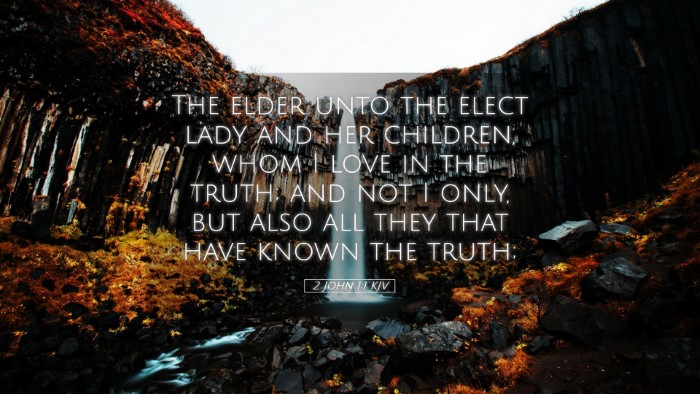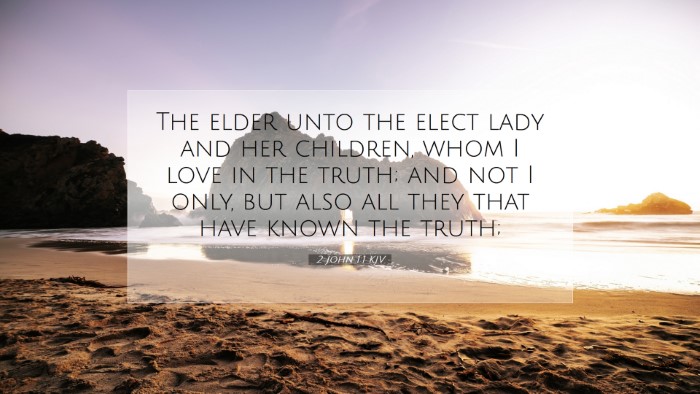Bible Commentary on 2 John 1:1
Verse Context: 2 John 1:1 states: "The elder unto the elect lady and her children, whom I love in the truth; and not I only, but also all they that have known the truth."
Introduction
This brief but profound epistle attributed to John addresses the dynamic and crucial relationship between truth, love, and community in the context of the early Church. The verse serves as an introduction that sets the tone for the themes explored throughout the letter.
Exegesis of the Text
-
The Elder:
John identifies himself simply as "the elder," which reflects his humility and pastoral role. Matthew Henry notes that this title implies a position of authority gained through age and experience, whether referring to his advanced years or his status as an apostle. The absence of a specific title emphasizes the universal nature of his message.
-
The Elect Lady:
Adam Clarke interprets "the elect lady" as both a literal individual and symbolically representing the Church. This dual interpretation serves to connect personal and communal aspects of faith. The term “elect” suggests a chosen status, reminding readers of the divine selection of believers, echoing themes found in other epistles, particularly in the New Testament.
-
Whom I Love in the Truth:
John's declaration of love is significant. Albert Barnes emphasizes that love among believers is always grounded in truth. The phrase "in the truth" indicates that genuine love is not mere sentimentality; it is rooted in the recognition of and adherence to the gospel truth. This love is affirmed by the collective acknowledgment of the truth by others in the faith community.
-
And Not I Only:
The communal aspect of love is further emphasized when John states, "and not I only, but also all they that have known the truth." This inclusiveness suggests a broadened understanding of the Christian community where love is a shared experience, uniting believers in their understanding of the truth. This aligns with Henry’s view that true fellowship among believers stems from their mutual engagement with the truth of Christ.
Theological Insights
This opening verse encapsulates fundamental theological themes that deserve further exploration, particularly the relationship between love, truth, and community.
1. The Nature of Truth
In the face of various heresies that threatened the early Church, John emphasizes the necessity of truth as not only a doctrinal standard but also as an essential characteristic of Christian love. As Barnes suggests, the acknowledgment of truth nurtures a community of believers who uphold one another and guard against deceptive teachings.
2. Love as an Expression of Community
John's assertion of love among God's people calls for a communal expression of faith. Clarke notes that love must drive the believer's actions and serve as a witness to the truth. This love, reflective of Christ’s nature, should motivate believers to support, uplift, and correct one another in their walk with God.
3. The Role of the Church
This verse reminds readers of the collective responsibility of the Church as the body of Christ. The designation of the recipients as “the elect lady and her children” encourages an understanding of the Church as a nurturing environment for believers in their spiritual journey, reinforcing the familial aspect of faith.
Practical Applications
Reflecting on 2 John 1:1 offers numerous practical applications for pastors, students, and scholars:
-
Encouraging Authentic Relationships:
Church leaders should foster an environment where love characterized by truth is encouraged, mirroring John’s model of leadership.
-
Prioritizing Truth in Teaching:
Faithful teaching that upholds the truth of Scripture should be the foundation of all church activities, ensuring that love remains in accordance with God’s Word.
-
Nurturing the Next Generation:
The reference to “her children” highlights the importance of mentoring and discipleship within the church, emphasizing the call to equip the next generation in understanding and living out the truth of the gospel.
Conclusion
In sum, 2 John 1:1 serves as a powerful reminder of the intertwining nature of love, truth, and community within the life of the Church. As John addresses the elect lady, he encapsulates the vital role that truth plays in the believer's love for one another and the necessity of maintaining this truth in the face of challenges. This brief yet profound verse prompts continuous reflections on how believers can actively engage in nurturing love that is firmly rooted in the truth of God’s Word, building a vibrant community of faith that honors Christ.


